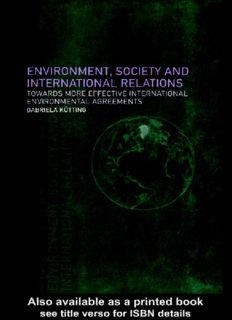
Environment, Society and International Relations: Towards More Effective International Environmental Agreements PDF
Preview Environment, Society and International Relations: Towards More Effective International Environmental Agreements
Environment, Society and International Relations ‘This is an important addition to the literature on the international relations of global environmental change. Dr Kütting’s focus on eco-centrism challenges conventional analyses of regime implementation.’ Professor Marc Williams, School of Political Science, University of New South Wales ‘In this useful book, Dr Kütting provides clear and direct discussion of an important problem. Her work has added value, both because it is rooted in a close study of two cases and because she makes a conscious effort to interrogate the adequacy of international relations theory from that basis. This book has much to recommend it.’ Dr Gwyn Prins, Senior Research Fellow, Royal Institute of International Affairs What are the connections between environmental diplomacy and environmental protection? What makes an international environmental agreement effective? In the past thirty years the number of international environmental agreements has steadily risen to reach record numbers. However, the quantity of international environmental agreements recently concluded should not be taken as evidence of a necessary increase in quality. The number of agreements may be impressive but this does not mean that the terms of the negotiated agreement necessarily help to improve the state of the environment. These are the issues which Gabriela Kütting addresses in this cutting edge study of the effectiveness of international environmental agreements. Based on a critique of traditional regime theory, this book outlines the structures in which agreement-making operates and demonstrates that a fundamental reassessment of the relationship between environment and society is necessary. Environment, Society and International Relations offers new insights into the study of social organisation and its effect on the environment. It also offers a compelling critique of neoliberal institutionalist thought, which has rarely been presented in such a thorough and convincing way. This ground-breaking volume is an essential resource for students and researchers of International Relations, Environmental Studies and International Political Economy, as well as for policy analysts. Gabriela Kütting is a lecturer in International Relations at the University of Aberdeen. Her articles on International Relations/International Political Economy and the environment have been widely published in journals including International Environmental Affairs and Environmental Politics. Environment, Society and International Relations Towards more effective international environmental agreements Gabriela Kütting London and New York First published 2000 by Routledge 11 New Fetter Lane, London EC4P 4EE Simultaneously published in the USA and Canada by Routledge 29 West 35th Street, New York, NY 10001 Routledge is an imprint of the Taylor & Francis Group This edition published in the Taylor & Francis e-Library, 2001. © 2000 Gabriela Kütting All rights reserved. No part of this book may be reprinted or reproduced or utilised in any form or by any electronic, mechanical, or other means, now known or hereafter invented, including photocopying and recording, or in any information storage or retrieval system, without permission in writing from the publishers. British Library Cataloguing in Publication Data A catalogue record for this book is available from the British Library Library of Congress Cataloging in Publication Data Kütting, Gabriela Environment, society, and international relations: towards more effective international environmental agreements/Gabriela Kütting. p. cm. Includes bibliographical references and index. 1. Environmental policy–International cooperation. I. Title. JZ1324.K88 2000 363.7´0526–dc21 99–053190 ISBN 0-415-21465-3 (hbk) ISBN 0-415-21466-1 (pbk) ISBN 0-203-13080-4 Master e-book ISBN ISBN 0-203-17671-5 (Glassbook Format) For Pavlos Contents Preface ix List of Abbreviations x PART I Distinguishing between institutional and environmental effectiveness 1 1 Introduction 2 2 International environmental cooperation and IR: what is missing? 11 3 IR theory and effectiveness 23 4 The four determinants of environmental effectiveness 38 PART II Empirical studies 59 5 The consequences of ignoring environmental effectiveness (I): the Mediterranean Action Plan 62 6 The consequences of ignoring environmental effectiveness (II): the Convention on Long-Range Transboundary Air Pollution 83 viii Contents PART III Environment, society and international relations 97 7 Social and structural origins of environmental degradation 98 8 The social origins and context of acid rain and pollution of the Mediterranean Sea 114 9 Conclusion 131 Notes 143 Bibliography 147 Index 168 Preface This book arose out of the realisation that a gap needed to be bridged between the institutional international relations (IR) literature concerned with international environmental agreements and the environmental literature studying the social origins of environmental degradation. I hope that this book will prove beneficial for both camps: introduce a wider focus for IR by arguing the need for an inclusion of the study of the environment–society relationship and contribute to the environmental literature by showing how IR and the study of the environment can be linked. Many people have helped in the completion of this project. I am particularly indebted to Julian Saurin, Marc Williams and Pamela Shaw for their intellectual stimulation, time, encouragement and interest in my work. Thanks are due to the MAP and CLRTAP secretariats who helped by providing access to officials as well as the British and German delegations to CLRTAP who gave me observer status during Working Group on Strategies meetings. Libby Assassi, Caroline Thomas, Barbara Adam, Detlef Sprinz, John Abraham, Branwen Gruffyth Jones, Sonja Boehmer-Christiansen, John Vogler, Evangelos Raftopoulos, the BISA Environment Group and the Sussex University IR and CDE research student discussion groups have helped me through comments and discussions. I have benefited from the friendship and emotional support given by my parents, Faiza Zaheer, Gaby Kittel, Zivka Mares Randic and Derek Shaw. This book is dedicated to my friend Pavlos who sadly lost his mother last year. Pavlos and I share our interest in the state of the Mediterranean environment and I hope that he will be able to develop this and his other interests as he would have done without the tragic changes in his childhood.
Description: